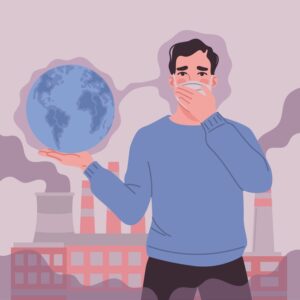Introduction
Air pollution is a global concern, impacting not only the environment but also our health. In recent years, researchers have delved into the intricate relationship between air pollution and allergies. This article explores the various facets of this connection, shedding light on how polluted air can affect individuals with allergies.
Understanding Air Pollution
Before we delve into the relationship between air pollution and allergies, it’s essential to grasp the nature of air pollution itself. Air pollution comprises a mixture of harmful particles and gases released into the atmosphere, often as a result of industrial activities, vehicular emissions, and natural sources. These pollutants can have detrimental effects on both human health and the environment.
Allergies and Their Prevalence
Allergies are a common health issue, affecting millions of people worldwide. They occur when the immune system reacts excessively to substances in the environment known as allergens. Common allergens include pollen, dust mites, pet dander, and certain foods. Allergies can manifest in various forms, including respiratory allergies (e.g., hay fever), skin allergies (e.g., eczema), and eye allergies (e.g., allergic conjunctivitis).
Relation Between Air Pollution and Allergy
Air pollution can have a significant impact on respiratory health and can exacerbate allergies. Here are some key ways in which air pollution and allergies are related:

- Increased Allergen Levels:
- Air pollution can contribute to higher levels of airborne allergens, such as pollen and mold spores. Pollution particles can attach to these allergens, keeping them suspended in the air for longer periods and increasing exposure.
- Inflammatory Response:
- Exposure to air pollutants can trigger an inflammatory response in the respiratory system. This inflammation can make individuals more sensitive to allergens and worsen allergic reactions.
- Aggravation of Allergy Symptoms:
- People with allergies may experience more severe and prolonged symptoms when exposed to high levels of air pollution. Common allergy symptoms include sneezing, nasal congestion, itching, and watery eyes.
- Compromised Respiratory Defense:
- Air pollutants can compromise the respiratory system’s natural defense mechanisms. For example, particulate matter and pollutants can irritate the airways, making it easier for allergens to penetrate and trigger allergic reactions.
- Impacts on the Immune System:
- Prolonged exposure to air pollution may affect the immune system, potentially leading to an overactive immune response. This heightened immune activity can contribute to the development or exacerbation of allergies.
- Ozone and Allergies:
- Ground-level ozone, a major component of smog, has been linked to respiratory problems and can worsen allergy symptoms. Ozone exposure may also increase the production of certain allergens in plants.
- Long-Term Effects on Allergy Development:
- Some studies suggest that early exposure to air pollution may increase the risk of developing allergies and asthma in children. Prenatal exposure to air pollution has also been associated with an increased likelihood of allergic sensitization in offspring.
- Exacerbation of Asthma:
- For individuals with asthma, which often has an allergic component, air pollution can trigger or worsen asthma symptoms. This can include increased coughing, wheezing, and difficulty breathing.
Reducing exposure to air pollution through measures such as improved air quality regulations, decreased reliance on fossil fuels, and increased green spaces can help mitigate the impact of air pollution on allergies. Individuals with allergies may also benefit from monitoring air quality and taking precautions, such as staying indoors on days with high pollution levels.
The Link Between Air Pollution and Allergy
Recent research has shed light on the intricate relationship between air pollution and allergies. Prolonged exposure to polluted air can exacerbate allergic reactions and, in some cases, contribute to the development of new allergies.
Impact on Respiratory Allergies

Respiratory allergies, such as hay fever and asthma, are particularly susceptible to the effects of air pollution. Pollutants in the air can irritate the respiratory system, intensifying allergic symptoms. For individuals with preexisting respiratory allergies, exposure to polluted air can lead to more frequent and severe episodes.
Impact on Skin Allergies
Skin allergies, including eczema and hives, can also be aggravated by air pollution. The pollutants in the air can come into direct contact with the skin, triggering or worsening allergic reactions. Additionally, air pollution can compromise the skin’s natural barrier, making it more susceptible to allergens.
Impact on Eye Allergies
Eye allergies, such as allergic conjunctivitis, can be particularly distressing for those affected. Air pollution can increase the prevalence and severity of eye allergies by introducing allergens and irritants into the eye. Symptoms like redness, itching, and watery eyes can be exacerbated by polluted air.
Mechanisms Behind the Link
The precise mechanisms underlying the link between air pollution and allergies are still under investigation. However, it is believed that air pollution can enhance the body’s immune response to allergens, making allergic reactions more intense. Additionally, pollutants can directly act as irritants, exacerbating allergy symptoms.
Geographic Variations
The impact of air pollution on allergies can vary based on geographical location. Urban areas with high levels of pollution tend to have a more significant association with allergies. However, even rural areas can experience adverse effects, particularly when surrounded by industrial zones.
Protecting Yourself from Air Pollution
While it may be challenging to entirely avoid air pollution, several steps can be taken to reduce exposure and protect against its harmful effects. Using air purifiers, wearing masks, and monitoring air quality indices are practical measures individuals can take to safeguard their health.
Government Initiatives
Governments worldwide are increasingly recognizing the importance of addressing air pollution and its impact on health. Initiatives to reduce emissions, promote cleaner energy sources, and implement stricter regulations on pollution are essential steps toward mitigating the effects of air pollution on allergies.
FAQs
Can air pollution cause allergies if you’ve never had them before?
Yes, prolonged exposure to polluted air can increase the risk of developing new allergies.
What are some common symptoms of air pollution-related allergies?
Symptoms may include sneezing, coughing, itching, watery eyes, skin rashes, and difficulty breathing.
Are children more susceptible to air pollution-related allergies?
Children can be more vulnerable to the effects of air pollution on allergies due to their developing immune systems.
How can I check the air quality in my area?
You can monitor air quality through local environmental agencies or use air quality monitoring apps and devices.
What can I do to reduce my exposure to air pollution-related allergens?
Using air purifiers, wearing masks, and staying informed about air quality levels can help reduce exposure.
Are there any natural remedies for alleviating allergy symptoms exacerbated by air pollution?
Some individuals find relief through practices such as saline nasal irrigation and steam inhalation, but it’s essential to consult a healthcare professional for personalized advice.
Conclusion
In conclusion, the relationship between air pollution and allergies is a significant concern in today’s world. Air pollution has the potential to exacerbate existing allergies and contribute to the development of new ones. Understanding the link between air pollution and allergies is crucial for public health and underscores the importance of collective efforts to reduce pollution and protect individuals from its adverse effects.


